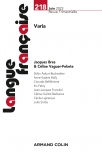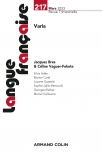
Langue française n° 200 (4/2018)
Pour acheter ce numéro, contactez-nous
Recevez les numéros de l'année en cours et accédez à l'intégralité des articles en ligne.
Cet article traite d’un usage particulier du conditionnel, illustré en contexte argumentatif et identifiable à l’expression d’une modalité déontique. Après avoir mis en évidence une valeur sémantique invariante du conditionnel, à savoir le caractère irrealis des états de choses auxquels il est appliqué, les auteurs analysent trois extraits de discours dans lesquels cette valeur semble éludée au profit d’un jugement d’« indésirabilité ». L’article ambitionne de montrer in fine que l’usage déontique peut être envisagé dans le cadre interprétatif même offert par le conditionnel d’irréalité, le locuteur décrivant des situations qu’il voudrait inexistantes.
In this paper, we tackle a specific (and overlooked) deontic usage of the conditional mood, found in argumentative contexts. We first highlight the semantic core of the conditional mood, which consists in expressing the irrealis nature of the state of affairs denoted, and then discuss three examples in which a non-desirability judgement supersedes this feature, therefore making it irrelevant. We thus show how the interpretative potential of the conditional mood allows deontic readings to emerge as a resource with which the speaker can convey her opinion that certain actual states of affairs should no longer be the case.

